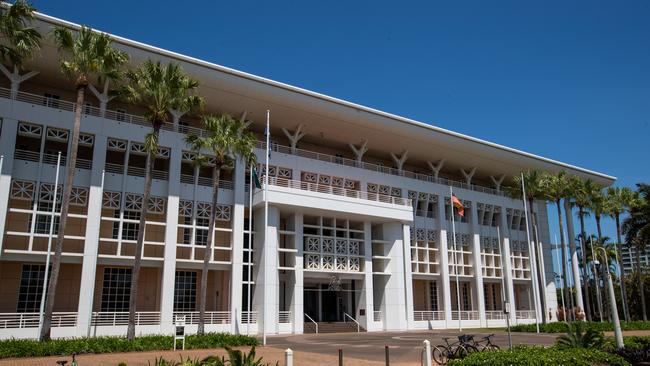Matt Cunningham: Santos’ Barossa project’s impact on NT economy
The potential demise of the Barossa project is being cheered in some quarters. But it might be worth considering the real impact of that scenario.
Opinion
Don't miss out on the headlines from Opinion. Followed categories will be added to My News.
There are two events of the past fortnight that might seem unrelated, but they’re both significant when it comes to the Northern Territory’s future.
The first was the release of data from the Australian Bureau of Statistics on public sector employment and wages.
It showed the Northern Territory has by far the largest number of public servants (more than 30,000 total employees) per head of population in the country, with an annual wages bill of more than $3 billion.
The second was a decision by the Federal Court to bar Santos from work on the southern section of its pipeline for the Barossa offshore gas project until a court hearing is held next year.
This followed a challenge by Tiwi Islands traditional owner Simon Munkara, who claims the pipeline will damage areas of cultural significance.
The ongoing delays to the Barossa development – which is costing Santos more than a million dollars a day – have raised concerns in some quarters that the project might not go ahead.
The simple link between the gas development and the public service is that without projects like Barossa, the size of the Northern Territory’s public service simply cannot be maintained. This issue was articulated in the NT Government’s 2019 report into budget repair.
That report found the government needed to constrain public service numbers and wages in the short-to-medium term to avoid an unsustainable budget position.
It then needed to foster private sector investment to ensure the Territory created more own-source revenue, allowing it to return the budget to surplus.
Neither of these things have happened.

When the report was released the Territory had 21,473 full-time equivalent public servants. (The ABS numbers are higher as they record total employees as opposed to FTEs).
According to the latest state of the service report from the Office of the Commissioner for Public Employment, that number has now grown to 24,008.
And while the Gunner Government capped public services wages, the Fyles administration – faced with high levels of inflation and serious cost-of-living concerns – has been forced to deliver significant pay increases across the (bigger) public service.
If the situation was dire in 2019, it’s bordering on catastrophic now.
The Territory’s budget position would be worse, if not for an increase in GST revenue, driven by increased retail spending interstate when interest rates were at record lows and Australians’ bank accounts were flooded with Covid stimulus money.
But as rising interest rates start to dry up spending, the GST revenue will fall.
The Territory is left with two options.
Drastically cut public service numbers and wages, which would have a devastating domino effect on population growth. Or fearlessly drive private investment.

As the budget repair report noted in 2019: “The Territory urgently needs a concerted whole of Territory effort to attract private investment to expedite major projects and stimulate economic growth more broadly. This will have the dual benefit of providing sustainable jobs for Territorians and supporting budget repair through increased own-source revenues and reduced pressure for economic stimulus expenditure.”
This is why projects like Barossa are so important.
But as the legal challenges and delays continue, it might be worth considering the impact if Barossa fails to go ahead.
There was some rare good news in the NT Government’s mid-year report released last November.
It recorded total state final demand growth of 7.7 per cent, the strongest result of all jurisdictions and driven mainly by private investment, which was up 26 per cent. “The growth in private investment reflects continued strength in business investment, particularly non-dwelling construction, likely related to progress on the Barossa project,” the report said. During Budget estimates in June, deputy under treasurer Michael Butler said if the Barossa project did not go ahead, state final demand would fall to a flat or “possibly minor negative” position.
Gross state product would also reduce significantly from 2025, when Barossa gas is due to begin production at the Darwin LNG plant.
The potential demise of the Barossa project is being cheered in some quarters.
But it might be worth considering the real impact of that scenario, particularly if you are one of the 30,000 people employed in the Northern Territory’s public service.
Matt Cunningham has worked as a journalist in the Northern Territory for more than 12 years. He is a former editor of the Northern Territory News. Since 2016 Matt has been the Darwin Bureau Chief and Northern Australia Correspondent for Sky News.



